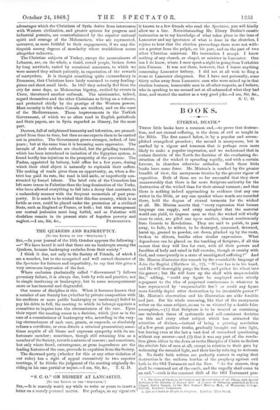THE QUAKERS AND BANKRUPTCY.
[TO THE EDITOR OF THE " SPECTATOR:1
SIR,—In your journal of the 10th October appears the following : —" We have heard it said that there are no bankrupts among the Quakers, because bankruptcy excludes from their society."
I think it due, not only to the Society of Friends, of which I am a member, but to the recognized and well earned character of the Spectator for fairness and impartiality, to say that this gives a very erroneous impression of the fact.
Where exclusion (technically called "disownment ") follows pecuniary failure, it is always due, both by rule and practice, not to simple insolvency or bankruptcy, but to some accompaniment more or less immoral and disgraceful.
Our course of discipline is this. When it becomes known that a member of our Society has (whether by private composition with his creditors or more public bankruptcy or insolvency) failed to pay his debts in full, the meeting to which he belongs appoints a committee to inquire into the circumstances of the case. Upon their report the meeting conies to a decision, which (just as in the case of a commissioner of bankruptcy who, according to the vary- ing circumstances of each case, grants, or suspends, or absolutely refuses a certificate, or even directs a criminal prosecution) some- times acquits of all blame and expresses sympathy with its un- fortunate member ; sometimes, though still retaining him as a member of the Society, records a minute of censure ; and sometimes, but only where fraud, extravagance, or gross imprudence are the leading features of the case, proceeds to expulsion from the Society.
The disowned party (whether for this or any other violation of our rules) has a right of appeal successively to two superior meetings, if he thinks the judgment of the meeting originally de- ciding in his case partial or unjust.—I am, Sir, 8:c , T. G. D.


































 Previous page
Previous page